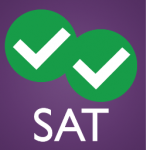 There are many little ways ways that the SAT and ACT differ. The content, the format, and the general mentality behind each is test-specific, at least in part. I’m not going to say that the two are completely unrelated — that’d be nonsense — since SAT – ACT score conversion is pretty reliable, after all. But there are details that really make them unique. You may already be aware of the trig—no trig split, or that there’s no science section on the SAT, but what about reading comprehension? How’s it different between the two tests?
There are many little ways ways that the SAT and ACT differ. The content, the format, and the general mentality behind each is test-specific, at least in part. I’m not going to say that the two are completely unrelated — that’d be nonsense — since SAT – ACT score conversion is pretty reliable, after all. But there are details that really make them unique. You may already be aware of the trig—no trig split, or that there’s no science section on the SAT, but what about reading comprehension? How’s it different between the two tests?
The Format
The SAT and the ACT have a pretty big divide here in general, not just in the reading comprehension parts. The ACT groups everything together into big chunks, but the SAT breaks it all up and mixes the types of questions. While you will find SAT reading comp in three or four separate sections (depending on whether the experimental section is math or verbal), on the ACT it all comes in one continuous streak. This makes ACT reading especially trying for some students — it can be hard to keep focused on your fourth in a row of dry, long academic texts.
But the ACT format is simpler, more predictable. The order is set. The reading section is third on the test, and there are always four passages with ten questions each: fiction, social science, humanities, and natural science, in that order. Each text is long (about 700 words). Sometimes, one of the texts will actually be from two different sources and will ask you questions on how the two compare, but it’s pretty rare.
In comparison, SAT reading passages are a bit more of a crapshoot. The long passage might have nine questions or twelve questions. The short paired passages might be in section two or in section seven. The fiction passage might be 850 words or 200.
You do know this, though: you’ll get four short passages (two of which will be paired with questions that refer to both), four medium-length passages (two paired, again), and one long passage. Other things are largely up in the air.
The Content
Both tests have a lot of dull stuff in the reading — no way around it. You might be very interested in the most influential performance artists, but then maybe you wouldn’t be so interested in the history of the salt trade. Either test could include topics like those.
So the most important thing to note here is about the types of questions that get asked. The SAT likes high-level vocabulary maybe a little too much, and that comes out not only in sentence completions (fill-in-the-blank questions), but also in questions on vocabulary from the reading passages. Those words can be pretty obscure. Meanwhile, the ACT’s occasional questions about individual word meanings don’t rely on dictionary knowledge, only on the context of the passage.
So, theoretically, if your vocab wasn’t great but you were a strong reader in every other way, you could get pretty average SAT scores in verbal but score higher in ACT verbal.
And finally, since the ACT doesn’t often include those paired passages, questions that ask you to compare and contrast two authors’ opinions on a topic aren’t as common. That’s a good thing, because those questions can be very tricky and often trap hasty test takers who answer with the wrong passage in mind.
In the end, most people will say that the two reading tests are similar, but there are definitely key differences worth knowing if you’re deciding between the tests.
 This post was written by Lucas Verney-Fink, resident SAT expert at Magoosh. For more advice on SAT prep, check out Magoosh’sSAT blog.
This post was written by Lucas Verney-Fink, resident SAT expert at Magoosh. For more advice on SAT prep, check out Magoosh’sSAT blog.
> For more SAT and ACT information, check out these articles at NextStepU.com
• Placement tests 101
• 10 tips for reducing SAT stress



